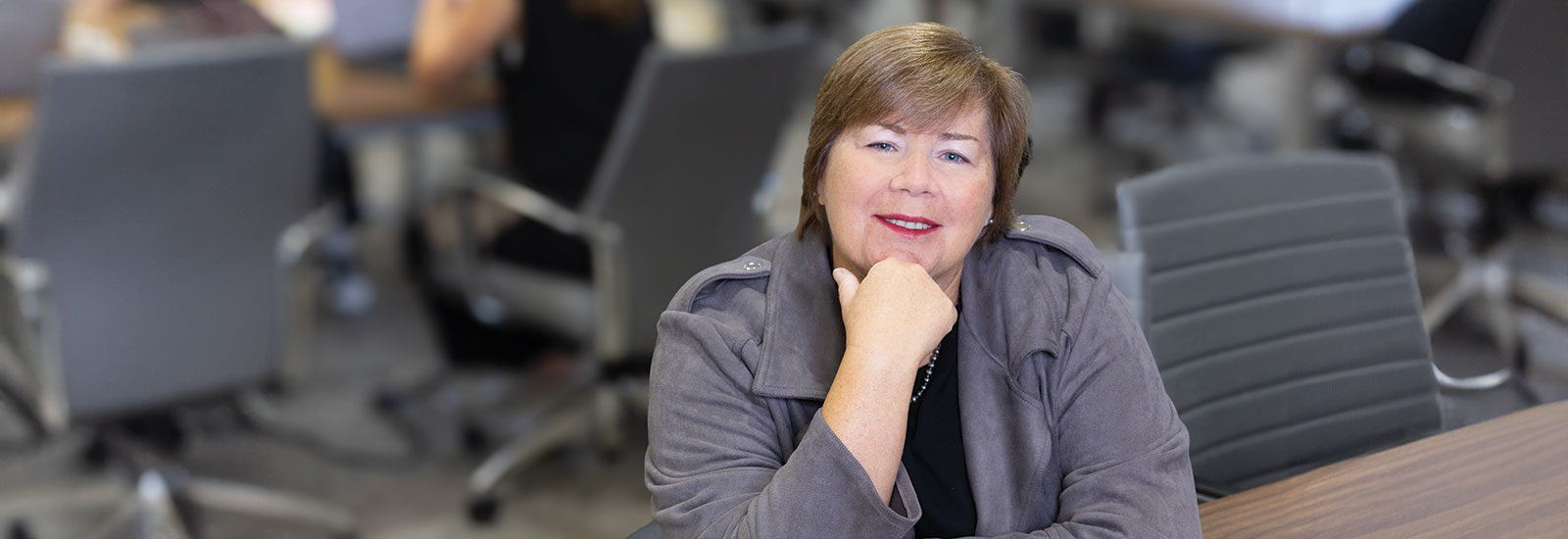by RICHARD WESTLUND
PHOTO BY JOSHUA PREZANT
Robin Schard, J.D. ’90, knows that law libraries are dynamic knowledge repositories. “Our jobs change constantly, as we need to understand how best to use technology in legal research and teach those skills to students and faculty,” said Schard, librarian professor and director of Miami Law’s Law Library. “While we stay on the leading edge of new automated and digital tools, our fundamental commitment is to provide friendly service to law students and faculty members using our resources.”
Widely recognized for her deep understanding of the evolving role of libraries in higher education, Schard is dedicated to supporting the Miami Law community through her teaching, research, and in-depth knowledge of the school’s archival resources. “We have gone from print to microfiche to online and AI-assisted searches,” she said. “While we provide guidance about these tools—including the ethical issues—who knows what tomorrow will bring.”
Schard is also a dedicated alumna who was honored with the Thomas Davison III Memorial Alumni Service Award in 2006 from the school’s Office of Law Alumni & Community Relations and Bar & Gavel’s Alumni Leadership Award in 2022. “I love working with alumni and seeing my former students again,” she said. “It’s a pleasure to be here at my law school alma mater.”
A Coastal Viewpoint
Schard grew up in Wildwood Crest on New Jersey’s southern shore, a town so small it relied on private support for its public library. “Our librarian supported my reading on any and every subject, even if it wasn’t something that my peers would be reading,” she said. “I returned to the little public library overlooking the ocean as my first professional position and loved providing the same encouragement and courteous customer service that I had received as a child.”
After high school, Schard earned a bachelor’s degree in Spanish and political science from Rutgers University before considering a career in law. When looking at her academic options, she chose Miami Law largely because of its international orientation. As an undergraduate, she spent her junior year in Spain, and Miami offered the ideal combination of learning opportunities.
At Miami Law, Schard worked as a part-time student assistant in the Law Library and served as an associate editor of the Inter-American Law Review. “I had so many wonderful professors and really enjoyed working with my fellow students on the law review,” said Schard, who liked the writing and research aspects of law school. “I didn’t know it at the time, but finding the most obscure resources for this journal was great preparation for my future career.”
After earning her J.D. cum laude, Schard completed a state court judicial clerkship before deciding to pursue a career in librarianship rather than law, so she returned to Rutgers to pursue a master’s in library science. She served as the head of reference services at Marquette University Law Library and as a reference librarian at the Atlantic City Free Public Library and the Wildwood Crest Public Library.
Returning to Miami Law
In 1999, Schard returned to Miami as assistant director for public services at the Law Library. In 2010, she was promoted to associate director and became director a decade later. Now, she leads a team of library faculty and staff who support students and faculty every day, including evenings and weekends. “We have a very active library and are always glad to answer questions and offer guidance,” she said. “That includes tracking down details about the history of the law school.”
In addition, Schard serves on the editorial board of the peer-reviewed journal Internet Reference Services Quarterly, whose articles focus on legal technology, digital issues with copyright, legal information, collaboration, and teams. She is also an active American Association of Law Libraries member, participating in several committees.
At Miami Law, Schard pays close attention to the evolution of research tools over the decades. “When the internet took off, there were conversations about how libraries would disappear because all the information you needed would be online,” she said. “Of course, it didn’t quite work out that way.” However, information gets lost with each new generation of technology, including printed publications that still need to be digitized and information stored in older digital formats.
Each year, Schard teaches two upper-level courses: Legal Research Techniques and Law, Technology, and Practice, that cover the growing array of tools available to attorneys and firms. “I tell students that today’s technology is not what they will have in the future,” she said. “I also teach them how to distinguish hype from substance, as well.”
Today, the hottest topic in legal research involves generative artificial intelligence tools like Open AI’s ChatGPT, which can write content and create images or videos. Generative AI is changing the education model, including how faculty teach law students and test their skills, according to Schard. “We want to leverage AI and other legal technology for Miami Law’s programs and projects, as well.”
To use tools like ChatGPT effectively, law students and faculty need training, said Schard. That includes constructing effective prompts, reviewing the results for accuracy and ethical issues, and incorporating the output into their own research and writing. “It’s fun learning how to use these tools,” Schard said. “We’re just at the start of this exciting new technology, and who knows what tomorrow might bring.”
But regardless of technological advancements, Schard says there is still no substitute for in-person legal research and education. “The pandemic showed us the benefits of going virtual, as well as the limitations,” she said. “We want everyone to feel comfortable coming to the Law Library and talking with our team. After all, our people are Miami Law’s greatest resource.”
Visit Miami Law Magazine homepage




